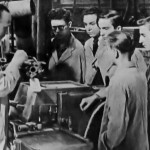Train for your career – 1950s booklet 
Introducing HARRIS LEBUS LTD.
A personal message from Sir Herman Lebus, C.B.E., J.P.
Chairman and Managing Director:
This booklet will give some information about Harris Lebus Ltd. To those young people who are thinking of joining the company.
They will find that we have based our training course on the belief that today the younger worker is keen to make full use of his mental capacity as well as of his manual skill.
The people we want to work with us are those who work and play with enthusiasm and if that is the sort of person you are, and you want to acquire a sound training in the craft of your choice, I believe you would be very happy with “H.L.” The booklet will tell you of the jobs for which you can train and, if you become one of the Harris Lebus team, you will find that it is the policy of the Company to assure that its employees work under good conditions and have a square deal.
It is now more than fifty years since I joined, what was then, a much smaller business and during that period I have shared the enthusiasm and pride of grand-fathers, fathers and sons amongst the workers with whom I have grown up.
It is my earnest wish that amongst those who join us there may be many who will spend happy years with us and attain positions of trust and responsibility.
We shall do our best; the rest is up to you.
The start of a career …
If you are leaving school you are probably about to make some of the most important decisions of your life and the first of these will be “How am I going to make a living?”
There are many difficulties. At fifteen to seventeen, young men and young women seldom know exactly what they want to do. Yet the first and most important factor in choosing the kind of work at which you aim to be successful is to find the job you will enjoy doing. Edison, the famous American scientist, knew that. Regularly he worked eighteen hours a day in his laboratory; but he said, “I never did a day’s work in my life. It was all fun.”
The man who enjoys his work has gone a long way towards a happy and healthy life, pleasing himself and his employers. At the same time, industrial misfits are a loss to society all the days of their lives. Think well, therefore, of the future as well as the present when you go off to work.
What furniture means to us …
Now furniture making is one of the oldest crafts in the world. Egyptian woodworkers were making chairs and tables before civilisation came to these islands. (Incidentally, the chair took a long time to gain popularity in England because men in armour preferred a substantial bench-with their backs to the wall!)
About one hundred years ago the firm of Harris Lebus started with a few men. By hard work, clear thinking, good management and by making honest furniture at a reasonable price, the firm has grown until today it has the largest furniture factory in the world, and has the high responsibility of a leading share in guiding a great modern industry.
A good name, either for an individual or for a firm, is like a plant; it can grow and develop, but will wither and die if injured or neglected. Our firm is rightly proud of it’s good name and if you become part of the firm you will have the power either to protect it or to damage it.
Your part in our firm …
No business can be run without adequate organisation and planning. This responsible and difficult work is done by a group of people known as the management. Part of their duty is to ensure that there is a steady flow of work, that apparatus and machines necessary for the work will be available, that the necessary materials will be purchased, that the furniture made will be of satisfactory design and quality and that this furniture will be produced at prices not greater than the market will pay. The firm consists of management and employees and both are essential to the firm’s life and success. In your case, the management provide every facility for you to develop your abilities and personality and to qualify for one of the various crafts, posts or professions which are represented in our organisation. They also provide many amenities and there is a sports club, to help you enjoy your leisure.
Educational facilities …
At first you will be employed and paid as a juvenile worker. This will be a probationary period, during which you will get to know us and we get to know you. If your work is satisfactory and your capabilities are sufficient, you will be given the opportunity to train for one of the following crafts:-
Wood machining : Veneering : Jig making : Cabinet making : Polishing and finishing : Upholstery
If selected you will be given a learnership certificate, and be released one day each week for the first two years to attend suitable classes at one of the local technical colleges. The learnership course lasts four years and during this time, you will receive any advice and help which you may need to assist you in making satisfactory progress.
If you train for one of the crafts you will be invited to join the National Union of Furniture Trade Operatives, which will provide you with additional advice and assistance.
If you wish to train for some other vocation such as draughtsman, accountant, commercial artist or electrician and you have the necessary ability and aptitude, somewhat familiar education facilities will be available.
If you become really interested in your training, as we hope you will, and if you are really serious about wishing to get on, it may be advisable for you to attend some evening classes in addition. If so, we shall give you every assistance in choosing the most suitable classes and we shall help you in other ways during the progress of your training.
There are other advanced educational opportunities which do not arise at this stage, when you are starting to climb the ladder, but there is no top limit to what you may achieve, if you have the necessary ambition, determination and ability.
General advice …
The first work that you will be given may appear to you to be very simple. However simple it may be, it can be done well or badly and even the simple jobs are necessary an important parts of our work.
If these simple jobs are not done, we cannot make furniture. Small jobs done well will lead to bigger jobs but they also provide you with an opportunity of watching more difficult work going on around you and of learning how this work is done. Whatever job you are given, take care that you do it well enough to satisfy not only the supervisor, under whose control you come, but also yourself. If you set yourself a high enough standard (and why should you ever be content with a second-rate standard?) what satisfies you will probably satisfy the supervisor also.
You will find that your success in industry will depend largely on one thing – how well you can think. If you are going to be a craftsman, your tolls will be guided by your brain. So practice thinking – not only about the big things, but about everything you do. Ask as many questions as you like but always try to work the answer out yourself first and then ask to see if you are right. You will find too, that the new conditions are in many ways very different from those which you have previously experiences and your success and happiness in years to come may be greatly affected by the way in which you adapt yourself to these new conditions.
While at school your life was arranged for you; you were told what to do and when to do it and very little choice was left to you. In industry you will find that you have more freedom. Freedom is a good thing but it involves responsibilities and you should make up your mind at once to use your freedom well.


